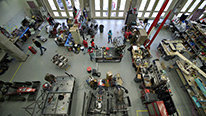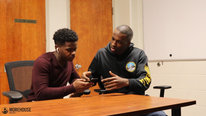NSF Awards: 1723404
The Distance Learning Workshop was held on April 6-7, 2018 at the University of Nevada, Las Vegas (UNLV). We recruited STEM faculty and administrators within UNLV, as well as other universities, especially those in the western public school area and minority-serving institutions. The workshop aimed to provide lessons learned from both faculty teaching in this area and students who have learned through this modality and to present the participants with examples of successful implementation of distance learning curricula.
A pre-assessment was completed by participants upon registration for the workshop. The survey data were utilized to assess the needs of participants and to develop the final workshop materials. The data were also provided to workshop speakers so they could tailor their lecture and learning activities accordingly. Speakers were to present comprehensive coverage of various tools used to develop integrated distance learning in STEM curricula, especially engineering and the sciences.
In addition to lecture presentations, the workshop had several collaborative activities, panel discussions, and guided learning activities to develop actual courses they could take back to their own institutions. Participants were given one-on-one instruction, workshop presenters, leaders, and others to guide their development and answer questions that they may have.
Upon completion of the workshop, participants were given a link to complete the post-workshop survey prior to their departure from the presentation venue. Participants were also given a certificate of completion to acknowledge their time and participation in the workshop. A six-month post workshop survey was also conducted.










Mohamed Trabia
Associate Dean for Research, Graduate Studies, and Computing and Professor of Mechanical Engineering
Welcome to the "Distance Learning Workshop for STEM Faculty" video presentation. Current students are not at ease with classical teaching techniques; they are more at ease with online knowledge. They also prefer to absorb material at their own pace from multiple sources. On the other hand, STEM faculty in public schools, especially those that cater to nontraditional and underrepresented students are typically overwhelmed by the daily teaching demands to explore alternative teaching techniques.
The goal of this workshop is to bridge this gap by introducing participating faculty to distance learning techniques. More than fifty faculty from public universities and community colleges. The workshop combined experiences of faculty who implemented distance learning techniques in their curricula, testimonials from students about their distance learning experience, along with multiple hands-on experiences. Pre, post, and 6-month surveys indicated that the perception of distance learning has improved significantly. Multiple faculty has since started switching to distance learning or hybrid formats.
If you have any questions or comments please use the discussion board here.
Brian Drayton
Thanks for this presentation, the topic is certainly of current relevance to a lot of schools who are struggling with the problems you identify, in a time of declining enrollments.
Although you speak of "distance learning" techniques, I infer from the video that you are actually implementing these innovations with resident/communiting students – so this sounds like what some people call "flipping" the classroom. Am I hearing that right? Or maybe you're doing both — reaching out to students at a distance, as well as flipping "regular" classes?
Mohamed Trabia
Associate Dean for Research, Graduate Studies, and Computing and Professor of Mechanical Engineering
Dear Brian
Because of the introductory nature of the workshop and because many participants came with a high level of skepticism, we presented participants with techniques that can help them develop either completely online or hybrid courses.
Patricia Marsteller
Assoc Dean and Professor of Practice
Does sound like Flipped classroom approach. Have you seen the site at UW?
https://www.washington.edu/teaching/teaching-re...
Great tips!
Also there's a wealth of literature on active learning and flipping? What strategies are you using in class?
Do you use quizzes or embedded questions in the videos?
How do you ensure that students use the materials?
Mohamed Trabia
Associate Dean for Research, Graduate Studies, and Computing and Professor of Mechanical Engineering
Dear Patricia,
As I mentioned to Brian above, we presented both techniques in the workshop through combination of testimonials and hands-on exercises.
Thanks for the link. This looks useful. In our case, we collaborated with UNLV Office of Online Education which has its own resources and staff to help our faculty. They were an essential part of this Workshop by guiding many of the exercises. Their web site is:
https://www.unlv.edu/provost/online-education
Terri Norton
Thank you for your presentation. Do you follow-up with the workshop participants to see if they have implemented the techniques learned in the workshop? And do you have a sense of how implementation has affected their course engagement and student performance?
Mohamed Trabia
Associate Dean for Research, Graduate Studies, and Computing and Professor of Mechanical Engineering
Dear Terri
Yes we asked them. Several embarked on incorporating some components of hybrid format in their courses. Few switched to a completely online format.
Many indicated that they would like to but have limited institutional support.
We feel that another in-depth workshop will help these faculty expand into the distance learning area.
Alex Rudolph
Professor
Very interesting approach to broadly disseminating learning about on-line courses. I would like to know more about the details of how the workshop was run. Was it on-line or face-to-face? Either way, what logistical or technical challenges did you have to overcome? I am also interested whether you are tracking outcomes in the actual classes being transformed by your workshop. The one example in the video mentioned increased number of questions in the face-to-face class. How about changes in mastering of concepts and learning outcomes? Have those been measured and compared?
Mohamed Trabia
Associate Dean for Research, Graduate Studies, and Computing and Professor of Mechanical Engineering
Hi Alex
The workshop was face-to-face. Technical challenges included:
Our six-month survey indicated that portion of the participants are incorporating distance learning techniques in their courses. Within the College of Engineering at UNLV, the number of distance/learning hybrid courses is steadily increasing. Our aim is to reach 10% across the college.
It is still too early to assess topics such as changes in mastering of concepts and learning outcomes. I plan to do so in 2-3 years.
Alexander Rudolph
Deanna Privette
Interesting approach to learning. Since STEM is such a hands-on approach to learning, how have you integrated hands-on to on-line learning?
Mohamed Trabia
Associate Dean for Research, Graduate Studies, and Computing and Professor of Mechanical Engineering
Hi Deanna
Do you mean lab components of the courses?
Deanna Privette
Yes!
Mohamed Trabia
Mohamed Trabia
Associate Dean for Research, Graduate Studies, and Computing and Professor of Mechanical Engineering
Hi Deanna
Because of the variety within STEM, the focus was mostly on the lecture section of the courses.
We however had experts discussion possible ideas for labs within distance learning environment including virtual labs, and kits.
Stephen Alkins
Diversity, Equity, and Inclusion Officer
Great approach to incorporating and improving online learning. This is often an overlooked population in academic and professional settings. Along the lines of the assessment, when you have data for both online and in-person programs, I'd be interested to know student perceptions of the learning supports that are offered for the online courses. It seems that the physical disconnect in online learning would be compensated for through extra support, but this is not always the case.
Also, with the emphasis on teaching offsite individuals, how did your instructors maneuver complications in team project-based learning?
Patricia Marsteller
Assoc Dean and Professor of Practice
I'm also really interested in engaging groups in this arena. One of the future trends is for more team based science and team based approaches to many jobs. Can you tell us how workshop participants can be engaged in team work.
Mohamed Trabia
Associate Dean for Research, Graduate Studies, and Computing and Professor of Mechanical Engineering
Hi Patricia
You are correct. There is an increasing emphasis on team-based courses. We have not however emphasized this aspect in the workshop. As I mentioned in my reply to Stephen Alkins, we had experts from ASU discuss ways to help off-campus students working in groups by using various communication and project management software.
Mohamed Trabia
Associate Dean for Research, Graduate Studies, and Computing and Professor of Mechanical Engineering
Hi Stephen
Great questions. Here are some thoughts:
Further posting is closed as the showcase has ended.